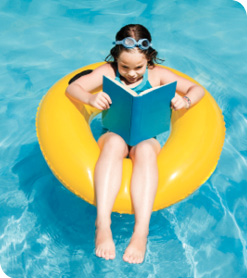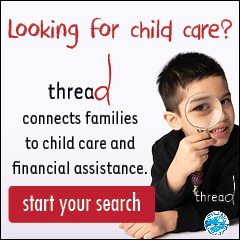
STOP THE SUMMER SLIDE
By Haley Nelson
For kids, summer vacation means freedom from the hustle and bustle of the busy school year. It can also mean a slide in academic skills and knowledge. Research shows that teachers generally spend the first two months of school re-teaching material students have forgotten over the summer. But the good news is that summer learning loss is preventable. Here are a few easy – and fun – ways to help stop the slide:
Head to the library
The library is a great, free resource. Check out books that interest your child. The librarian can offer many other book suggestions that match your child’s reading ability and interests. Join your local library’s summer reading program and arm your child with their very own library card.
Students who don’t participate in any summer enrichment or educational activities lose about 22 percent of knowledge and skills gained during the school year.
Source: National Summer Learning Association.
Go day tripping
Take a trip to a museum or zoo – they’re fun and packed with science-learning opportunities. Or visit historical sites – they offer a three-dimensional history lesson.
Think summer camp
Lots of summer camps offer education-related opportunities (see our Summer Camps & Activities Guide). Learning is much more fun for kids when it’s intertwined with physical activities or games. They’re learning without even knowing it!
Make the most of your vacation
Going on a vacation can be an educational experience. Encourage your children to read up on the place you are going to. They can help you plan for the trip, brushing up on their organizational skills as they make lists, pack, plan a route and so on. Determining a budget and even counting down to the vacation can help reinforce math skills.
Grow a garden
Involve the kids with planting seeds and watering the plants and flowers for a little science lesson in disguise. Arm them with a daily gardening journal where they can include their own pictures or observations, any problems encountered and how they solved those issues.
Get cooking
Get your kids involved in helping you make easy summer treats like ice cube popsicles as well as more involved meals for dinner. From writing up a grocery list to finding things in the grocery store to carefully measuring ingredients, your kids will brush up on their English and math skills.
Game night
Have a weekly game night (which also doubles as family time). Whether you’re playing board games, cards or other fun activities, there are many ways to incorporate learning opportunities – counting, strategizing, negotiating and turn-taking – as well as plenty of laughs.
Write about it
Supply your kids with a scrapbook or journal and encourage them to draw pictures and write about their summer experiences. Have them write letters to friends or distant family members. Doing so will keep their writing skills fresh and encourage creativity.
Get a job
A summer job can be a great learning opportunity, allowing your child to apply skills such as in math and computer technology. It also helps develop a sense of responsibility. For younger kids, organizing a garage sale can give them an instant lesson in running a business and money management.
Lend a hand
For teens, volunteering or working on community service projects is another option. Youth-oriented summer camps, local museums, animal shelters and libraries are often looking for extra help. This experience is not only valuable for personal and professional development, but it also looks good on college applications.
Explore Alaska
Summer in Alaska is filled with many great opportunities for exploration – from nature-filled adventures to fun, educational events. Check out our Out & About calendar for lots of ideas!










